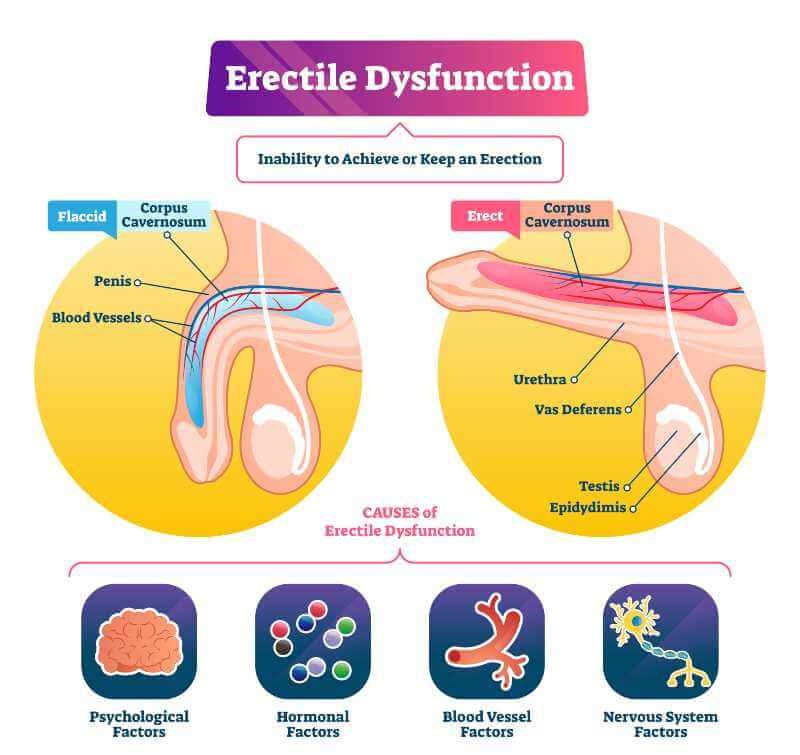Erectile dysfunction is a problem that men encounter from time to time. Erectile dysfunction is a common problem among men starting 40. 30%of men at the age of 40 have experienced this compared to 70% of men at the age of 70. Cardiovascular disease, hypertension and diabetes affect the ability to have an erection negatively.
What is erectile dysfunction?
Erectile dysfunction is defined as a recurrent and frequent inability to achieve or maintain an adequate erection for sexual performance. Erectile dysfunction is sometimes referred to as impotence or ED and erection problems are very common, especially in men over the age of 40.
Erectile dysfunction can cause psychological problems in men. The experience of not being able to perform sexually can cause stress and embarrassment, affect libido negatively and infertility problems in couple’s trying to conceive.
Erectile dysfunction Causes
Erectile dysfunction in most cases is caused by a combination of physical and psychological factors. Having minor physical issues can cause diminished libido which on its own can add to psychological factors aggravating the erectile dysfunction etc.

Common causes of erectile dysfunction include:
- Some underlying conditions can affect the blood flow to the penis such as; diabetes; high blood pressure, atherosclerosis, cardiovascular diseases, elevated fat and cholesterol levels in blood. Diminished blood flow to the penis makes it difficult to have and maintain an erection.
- Hormonal disorders, such as thyroid disease and testosterone deficiency
- Chronic renal failure.
- Malignancies
- Anatomical disorders
- Diseases of the nerve system
- Certain medication
Causes of psychological erectile dysfunction
Causes of physical erectile dysfunction account for 90% of erectile dysfunction cases. The remaining 10 percent of erectile dysfunction cases have an underlying psychological cause. Psychological causes of erectile dysfunction include:
- Depression the most common mental disorder.
- Tension and fear of intimacy.
- Problems with the partner.
- Stress
Erectile dysfunction risks
There are some risk factors that can cause erectile dysfunction or increase the likelihood of erectile dysfunction;
- Age >50.
- Obesity.
- Smoking or using tobacco products.
- Sleep disorders.
Diagnosis of Erectile dysfunction
Erectile dysfunction may negatively affect a man's quality of life. Erectile dysfunction on its own is not a serious condition, on the other hand erectile dysfunction may be a symptom of a serious health problem. An andrologist should be consulted to find out the patients' history and determine if there is a serious underlying condition causing the erectile dysfunction.
Tests to determine the underlying factors of erectile dysfunction include:
- Physical examination.
- Blood tests. Extensive blood tests might be needed to determine if there are any underlying reasons for the Erectile dysfunction; complete blood picture, hormonal profile, lipid profile, kidney functions, liver functions, random blood sugar and HbA1c.
- Urine tests (urine analysis) urine tests are used to look for signs of diabetes and other underlying diseases.
- Ultrasound an ultrasound of the penile blood flow can help diagnose issues with blood perfusion and circulatory problems of the organ.
- Psychological examination. Your doctor may ask you some questions to evaluate if you suffer from depression or other possible psychological issues causing erectile dysfunction.
Erectile Dysfunction Symptoms
Men are considered to suffer from erectile dysfunction if they experience symptoms of erectile dysfunction. frequently
Symptoms of erectile dysfunction include:
- The male penis’s inability to have an erection and engage in intercourse.
- Difficulties maintaining an erection.
- Some other form of sexual problems, such as premature ejaculation, delayed ejaculation, or not being able to have an orgasm.
- An incomplete erection of the penis hinders the ejaculation of the male fluid.
- Low libido.
Erectile Dysfunction treatment
Erectile dysfunction treatment should work on the following points according to the underlying cause;
- Treatments to strengthen the penile muscles.
- Treatments that help increase the blood flow to the penis which in turn supplies the muscles with oxygen and perfusion needed for its function. These pills are often taken 30-60 minutes before sexual activity and should be taken under a doctor’s supervision.
- Antidepressants
- Treatments to regulate other diseases, such as blood pressure, diabetes and elevated lipid profile.
- Vitamins or supplements
Testosterone erectile dysfunction treatment
Testosterone is not the only hormone that fuels a man’s sex drive and performance, but low testosterone levels have an impact on libido and the ability to have an erection. If low testosterone levels in blood are detected medication can be given to help restore normal levels.
Surgical treatments for erectile dysfunction
Surgical intervention is the last option in the treatment of erectile dysfunction and is used only when everything else has failed. The surgical options for erectile dysfunction are
- Micro vascular Surgery: This surgical procedure is aimed at penile revascularization and bypass blocked arteries.
- Penile implants: This surgery is the last option for men whom other conservative approaches had no impact.












